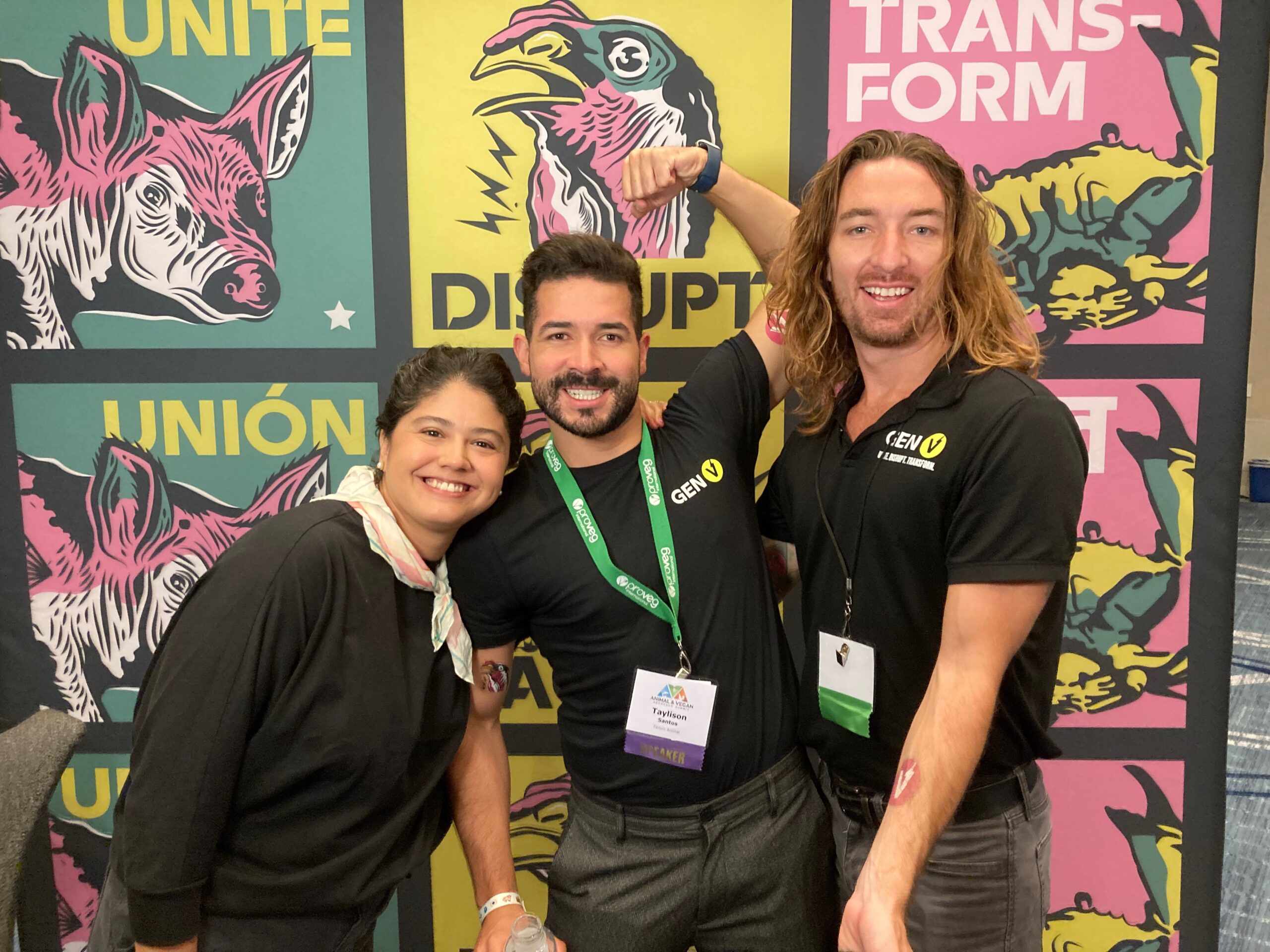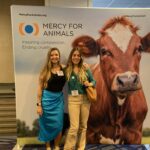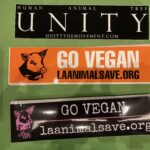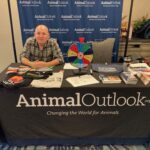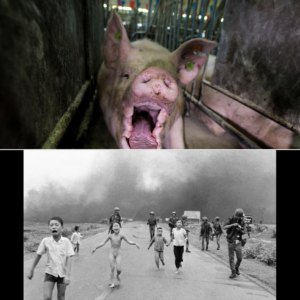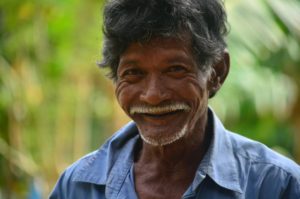I had a ton of fun connecting with so many smart, committed and inspiring people at this year’s Animal and Vegan Advocacy (AVA) Summit, in Los Angeles, CA. I was reminded once again of how refreshing it can be to spend time with like minded people! The AVA Summit succeeded in bringing together over 750 activists and advocates from around the world to share stories and network, and in this respect, we had a blast. Despite a few bumps, the AVA Summit was a resounding success, and I already have next year’s date marked on my calendar. 🙂
Here is a quick rundown of the sessions that I attended (Click here for the AVA Summit Transparency & FAQ page):
Opening Ceremony & Keynote
Potential. The keynote presentation discussed the lost potential for animals caught in factory farming, as well as how those who were rescued lived out their potential. Also, the potential of activists to be the best versions of themselves, and the potential of our movement to change the world with past examples and a vision towards the future.
Sharon Núñez, Animal Equality, President
Dawn Moncrief (Sponsor), A Well-Fed World, Founder/President
Constance Li (Sponsor), Impactful Animal Advocacy, Strategic Advisor
Sebastian Joy (Sponsor) ProVeg
Monica Chen (Sponsor) New Roots Institute, Executive Director
Julia Reinelt (Moderator) Animal & Vegan Advocacy (AVA) Summit, Director
The Climate Opportunity for Reducing Animal Suffering
Dr. Galina Hale and David Meyer showed in detail how it is not possible to meet the Paris climate goals without eliminating global animal agriculture by 2050. They discussed how alt-proteins can theoretically get us there but also what the shortcomings are and how to fix them.They explained that there is no map for getting animals out of the food system, as they try to adopt a strategy of working backwards from a perfect world concept. “Be that voice and understand, there’s a saying out of my heritage, Judaism, it’s not on you to finish the job, but neither are you free from doing the work. So none of us are gonna end factory farming anytime soon, but we do our best. We do the work, and every time we do that, we are doing the most important work we can for the least powerful and most vulnerable. We will win.” – David Meyer
David Meyer – Food System Innovations, CEO
Galina Hale – Food System Innovations, Chief Research Officer
Dawn Moncrief – A Well-Fed World, Founder/President
Becoming a More Confident Speaker
Meghan O’Brien Lowery, Director & Partner, Greenbaum Foundation, and the CEO of MegLow Consulting, a firm that provides a variety of support services to those working in the non-profit space to create more impact and change. Meghan workshopped speaking in public, from a quick 2 minute elevator pitch, to an hour and a half presentation. It was a Kumbaya kind of gathering, and a great chance to get on our feet, and share our unique voices. Meghan briefly discussed the following four parts of the brain, and how they impact our ability to be an effective communicator:
1. Cortex (creativity, thinking, language, values, time, hope) – When people are cold they cannot form language. If you are cold you will not be impactful as a public speaker. Your body shuts down.The logistics of just being in the room. Unknowns make you a less confident speaker. Ask questions: Who is going to be there? How old is the audience? Learn more about your space and audience.
2. Limbic (reward, memory, bonding, emotions) – The more visual your presentation, the better. We attract people when we are radiating. Public speaking, pitching, knowing when you are attracted to someone else. Knowing who you are is sexy. An attitude of I don’t need you-ness is sexy! Sexy indifference, buy them dinner before you ask to take them home. Success is effective communication, and the mutual understanding of each other’s side. Present a state of being that is strong, happy, and confident. Know when people are ready or not ready to hear your information.
3. Diencephalon (arousal, sleep, appetite, movement) – Make sure you get enough sleep, and nutritious food.
4. Brainstem (temperature, respiration, cardiac) – Make sure you are regulated as much as possible.
*We created an outside circle, and an inside circle, and then had to explain to a stranger our most “incredible” talent. People become excited when they talk about themselves, and what they love.
How to make Law, Movies, TV shows, Docus, or News – Secrets from DC and Hollywood
This is the first session where I had to leave because I was uncomfortable. The moderator praised the speaker Roger Wolfson for being a writer for US senators, and presidential candidates (as well as network TV shows, and something called Channel One). Really? Is that a good thing? Who knows what role a speechwriter plays in the lies and crimes of a politician. When Mr. Wolfson started talking loudly about his accomplishments, and praising politicians like Benjamin Netanyanhu, and Joe Biden (his website shows images of him and Nancy Pelosi), I was pretty much done. I have since learned that Roger Wolfson was once the VP of something called Channel One, which was a program targeting children in the classroom. According to Wikipedia, “Channel One was controversial largely because of the commercial content of the show. Critics claimed that it was a problem in classrooms because it forced children to watch ads and wasted class time and tax dollars…In 2006, the American Academy of Pediatrics reported that research indicated that children who watched Channel One remembered the commercials more than they remembered the news…Another report said that very little time was dedicated to actual news and that the majority of the programming was corporate marketing and PR tie-ins to promote products and services, arguing that it further corrupted the school setting with consumerism.” Regardless, Mr. Wolfson still had a lot of good information to share. Here are a few notes from the discussion that seemed to make sense:
Effective Pitch Requirements – Stakes. It has to be important on some level. Stakes are life and death when it comes to romance. Why does what you’re doing matter? Ideas need to have currency and freshness. Many well intentioned people don’t have fresh ideas. Your pitch should feel brand new, and fresh. You want to tell a story, a heroic story. The Brady Bill was passed because of the story of Brady being shot in the head. Next is the personal connection to you. Whatever your pitching, generic doesn’t work. What saved your life? Why does it matter to you?
Emotion – Involve and engage in emotion. If you are not having an emotional experience yourself, how does the other person feel? The goal is not to move the audience but to move you.
Branding – Branding reflects you. Your brand fits you and them.
Sweat Equity – You are there to help them. Don’t go for their biggest story, go for their smaller accomplishments.
Brain Trust – Developing all of your ideas with a brain trust. Run ideas by others first. If they are not excited, then don’t use it.
Roger Wolfson, Netflix, Writer
John Oberg, John Oberg Social, Founder
Click here to learn more about Benjamin Netanyahu, and Israel’s crimes against humanity.
Click here to learn more about the awfulness of Nancy Pelosi.
Advocacy in Europe and the Middle East
Colette Fox talked about how the School Plates Program was revolutionizing school food in the UK, with both a childhood obesity and climate crisis in full swing. With over 10 million meals swapped, ProVeg UK’s School Plates program is creating a healthier and more sustainable menu for Generation Alpha (high impact, low cost). I wanted to ask a question but I was shut down by the moderator who said that they were only taking questions through the AVA Summit App (Whova). As a former NYC public school teacher, I was going to push back on Colette’s claim that children influence their parents, as my experience has been just the opposite, especially when it comes to the promotion of plant-based nutrition (I left the session once it became clear that the audience was not going to be engaged). Seb Alex was scheduled to talk about how veganism and plant based eating is perceived in the MENA region vs the rest of the world, food relief campaigns in disaster areas (ex: Beirut explosion), the Vegan Islam initiative by Middle East Vegan Society, and other ways we can help organizations in the global north reach marginalized groups in their respective countries.
Seb Alex – Middle East Vegan Society, Executive Director
Colette Fox – ProVeg UK
Phichamon (Amanda) Thamasook (Moderator) – Sinergia Animal International, Communications Manager
Omri Paz – Vegan Friendly
Outstanding Presentation #1
Social Justice, LGBTQ, and Animal Rights, DEI & Social Justice Topic: Marginalized & Overlooked Communities
Dr. Faraz Harsini of Allied Scholars for Animal Protection (ASAP), and Chris Liptrot of Mercy For Animals both advocated for kindness and justice for all beings. Faraz talked about growing up in Iran and experiencing violence, and then explained how he juxtaposed his past with the food on his plate. Faraz became choked up and brought many of us to tears too, as he discussed his mother, and his coming out story. Faraz founded ASAP, to help university students and others on campus build ongoing, lasting advocacy organizations. As per Dr. Harsini, “I’m sick of animal rights organizations and student organizations becoming inactive because of a lack of support, lack of infrastructure, or lack of mentorship.” This was an outstanding session that emphasized the importance of standing up against all forms of discrimination and cruelty, and championing love, kindness, and justice for all. As per the ASAP website, “ASAP focuses on both short term (1-5 years) and long term (20-30 years) changes. By providing a unified infrastructure, ASAP ensures for the first time that there is a strong, effective, sustained, and united effort to end animal oppression on campuses across the country. The students we train and mentor will become the next generation of industry leaders in health, medicine, journalism, the environmental sciences, business, academia, government, law, and the nonprofit world.” Here is the highlight of Faraz’s presentation (on the subject of moderation and eating less animal products): “If you were about to be hanged for being gay because you were born in the wrong place at the wrong time and I was your advocate, would you want me to say let’s cut back, and try to kill fewer people, and give them more space? You may say, “I cheat a little bit”. Okay, is that acceptable? Well is it easier for you to go 100% vegan, or for an animal to suffer and die? You have the best intentions, but please try and do better…Why do we admire social justice leaders? They often stand alone to fight injustice and inequality. Let’s never shut up until every cage is empty, and animals are no longer on the menu.” The whole room gave the speakers a standing ovation. 🙂
Dr. Faraz Harsini – Allied Scholars for Animal Protection (ASAP), Founder and CEO
Chris Liptrot – Mercy For Animals, Global VP of Corp. Engagement
Naijha Wright-Brown – Black Veg Society
Click here for an excellent interview with Dr. Faraz Harsini on the always informative Our Hen House podcast.
Outstanding Presentation #2
Understanding & Combatting Animal Experimentation (Animals in Captivity, Labs & Other “Uses”)
Sumita Jonak is a UCLA graduate, and Navy Veteran, who works in Design, Operations Strategy, and Technology.
Lucky for us, she loves to talk about all things Animals, Science and Technology!
Here are the main takeaways from Sumita’s superb presentation (mostly verbatim):
Why Animal Experimentation is a Disastrous Strategy and Why Businesses Need to Adapt
– 90-95% drugs fail in humans even after passing animal tests
– 90% of human diseases are unsolved, and untreated (only 10% of human diseases have treatments (not even cures))
– Average cost is $2.6 billion per successful drug, after 10 years of R&D
What business spends $2.6 billion dollars per successful product, with over a decade in R&D, only to have a 95% failure rate?
Imagine if 95% of your Google searches failed. Imagine if Apple didn’t update the iPhone for a decade. Imagine if The Walt Disney Company spent $2.6B on a theme park and 95% of the rides failed. So why do we accept failure in Big Pharma as the cost of doing business? Maybe it’s time to change the “business as usual” mindset. Some scientists hide behind an armor of credentials and publications while still peddling philosophies from the 1800s. Basic research need not be pedestrian. Must we study the “whole living system” of a mouse, dog or monkey to truly understand how humans work? That’s a WTF moment. The “whole body” or “whole organism” retort used to be a solid end-of-discussion smackdown, but when she asked the indefatigable Aysha Akhtar, MD, how to respond, she stated what should have been obvious: “but it’s the wrong whole system, the wrong whole body.” So whatever glimpse of knowledge is gleaned is of dubious value as it has a paltry 5% successful translation rate to humans.
Let me repeat that —> 5% hit rate.
Cost —> $2.6 billion, with a B.
Time —> 10-15 years.
No other industry has those kinds of numbers and still exists with a business as usual bravado.
Here are some additional links from Sumita that may be helpful.
Click here to learn more from Sumita on Parabiosis.
Click here for Sumita’s powerful piece, “Science Can’t Afford to Monkey Around.”
Click here to learn more about Dr. Aysha Akhtar.
Click here for another review of Dr. Akhtar’s wonderful book, Our Symphony with Animals.
Alka Chandna, Vice President, Laboratory Investigations Cases, People for the Ethical Treatment of Animals (PETA)
Amy Meyer, Manager of Primate Experimentation Campaigns, People for the Ethical Treatment of Animals (PETA)
Vanessa Shakib, Co-founder & Co-director, Advancing Law for Animals
Indra Lahiri, Founder & Storyteller, Indraloka Animal Sanctuary
The Future of Meat
Alternative meat in the future could play a crucial role in facilitating a more compassionate world. ProVeg’s impact areas, include movement building to engagement, and an effort to drive positive change. Activism: “If you can impact the entire shift away from animal agriculture even by 1 second, you will save over 2,000 animals.” Education is not enough, globally meat consumption keeps going up, and education doesn’t change the upward trajectory. Give people the products that they like without the harm.
Bruce Friedrich – Good Food Institute, Founder & President, “Remaking Meat: The next global agricultural revolution”
Karthik Sekar – Climax Foods, Head of Data Science, “The Technological Argument Against Animal Agriculture: Why we’ll move on and how to do so quickly”
Josh Bisig – ProVeg, Senior Project Manager, “The future of meat and a more compassionate world.”
Zoe Novic (Moderator) Greener By Default, Healthcare Program Manager
Ukrainian Activists (Animal Advocacy in Wartime)
How can vegan advocacy continue during wartime? How does the war affect people and activism? In Ukraine, vegans didn’t lose their subjectivity and identification as a group. Various vegan movements and grassroot groups consolidated to start public discussions, educate non-vegans, and provide humanitarian aid to the most vulnerable groups. The purpose of this session was to acknowledge the many vegan victories during this difficult year, including “a celebration of veganism during the invasion of Ukraine”. Marta Ostrovska was up first and she immediately blamed ONLY Russia for the invasion of Ukraine, and made no mention of the United States’ efforts to nix peace negotiations with Russia at every turn over the last ten years. I was once again uncomfortable, and as soon as I realized that the moderator was not going to engage the audience, I went to another session.
Tamara Human, Every Animal (Ukraine), Director
Oksana Khomiak, Lviv Vegan Kitchen
Marta Ostrovska, Lviv Vegan Kitchen, Co-founder
Phichamon (Amanda) Thamasook (Moderator), Sinergia Animal International, Communications Manager
Click here to learn more about how the U.S. has thwarted peace negotiations with Russia on multiple occasions, while bringing us all closer to Nuclear Annihilation.
Good Art Project – Artist for Animals
Amy Burkman is a speed painter who has to be seen to be believed. She has raised over $1 million for animal rights, and is a tour de force! Her 10 minute cow painting creation was amazing to watch, and was later auctioned off for $2,500!
In other words, Amy Burkman Rocks!
Click here to learn more about Amy Burkman’s work and her battle with cancer.
Click here to see Amy Burkman’s talent in action.
Click here for Amy Burkman’s website & TED Talk.
Outstanding Presentation #3
How Not to Age
Dr. Michael Greger talked about his new book, How Not to Age, which will be released in a few months. Dr. Greger explained that getting older does not have to mean getting sicker. He discussed a few of the pathways for aging in our bodies’ cells and how we can disrupt each one of them. Processes like autophagy, the upcycling of unusable junk, can be boosted with spermidine, a compound found in tempeh, mushrooms, and wheat germ. The presentation also talked about the dietary and lifestyle patterns of centenarians and residents of “blue zone” regions where people live the longest and happiest lives. Dr. Greger presented simple, accessible, and evidence-based methods for preserving the body functions that keep us feeling youthful, both physically and mentally. He also shared his message with a sense of humor, and had us laughing out loud more than a few times! I hope that the AVA Summit folks release the videos for each session soon. This is one of many that I will be revisiting for sure!
Michael Greger, NutritionFacts.org, Founder
Dr. Faraz Harsini, Allied Scholars for Animal Protection (ASAP), Founder and CEO
Closing Ceremony & Keynote
Mercy for Animals’ Leah Garces closed the 2023 AVA Summit with a keynote presentation that included practical steps that the movement can take to unite with workers movements. She was introduced by David Coman-Hidy who spoke eloquently about whether the current position of the animal rights movement is a cause for hope, or despair. David discussed his own struggle with these questions and presented some ideas for strategists to consider moving forward. David’s speech really resonated, and when he was done, many of us rose to our feet in appreciation.
Leah Garcés, Mercy For Animals, CEO & President
Dave Coman-Hidy, Sharpen Strategy, Partner
Julia Reinelt (Moderator), Animal & Vegan Advocacy (AVA) Summit, Director
The 2023 AVA Summit in Los Angeles, CA, wasn’t perfect as most of the sessions seemed to run at the same time, and there was no WIFI, or tables in the conference rooms to allow us to properly take notes. Also, the vegan food was pretty ordinary (except for the fresh cut watermelon & pineapple which always rock), and the window for its availability was way too short too (food trays were set out for only 30-60 minutes at a time). Lastly, zero connections were drawn between our violent food system, which causes untold suffering, and the illegal ongoing US Wars that have killed millions of innocent people (which was to be expected). However, if you are going to offer a session on “wartime”, the least you can do is be honest and objective with regards to a war’s origin (the US has provoked Russia for decades with the continued expansion of NATO). Unfortunately, two of the speakers seemed to have doubled down in pretending that the U.S. has played no role in these ongoing conflicts & wars, as they completely ignored history, politics, the US War Machine, and how everything is related.
The bottom line? Kudos to the organizers of the 2023 AVA Summit, for an overall wonderful event. It was clear that a tremendous amount of thought, care, and hard work went into each day’s activities, and programs. With gratitude, I am already looking forward to seeing new friends, and new faces again next year in Washington, DC. Viva La AVA Summit! 🙂
*Main Image: Generation Vegan (Click here for the GEN V website)

